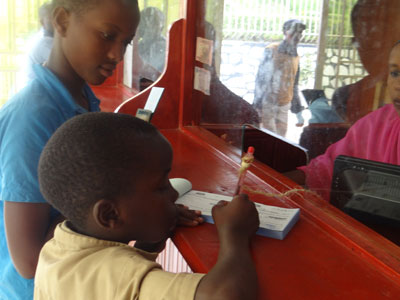Visit any upcountry school and you will get amazed at how much the pupils/students understand that they have to save the little they receive from their parents. They have even gone an extra step and formed savings clubs. “The most important thing is to start with the little money you get, and with patience, one may end up a millionaire,” said Zawadi Mugurwanyana, a senior five student at Ecole Secondaire Rusumo, Kirehe district. The teen has so far managed to save Rwf1000 with a local micro finance institution (Umurenge Sacco). Mugurwanyana started saving last month after undergoing training on saving and being helped to open an account by her school. Although the money is still little, the student is proud of her achievement.


Visit any upcountry school and you will get amazed at how much the pupils/students understand that they have to save the little they receive from their parents. They have even gone an extra step and formed savings clubs.
"The most important thing is to start with the little money you get, and with patience, one may end up a millionaire,” said Zawadi Mugurwanyana, a senior five student at Ecole Secondaire Rusumo, Kirehe district.
The teen has so far managed to save Rwf1000 with a local micro finance institution (Umurenge Sacco). Mugurwanyana started saving last month after undergoing training on saving and being helped to open an account by her school. Although the money is still little, the student is proud of her achievement.
"If I need a note book or soap, I cannot disturb my parents because this amount (Rwf1,000) would cover it,” she said.
But Mugurwanyana has no intentions of spending all her money on school materials. Her objective is to raise at least Rwf 16,000 by next year to buy a goat that she will keep at home.
"By the time I finish secondary school, the goat should have given birth. I will eventually start a goat farming project,” she says, adding that it is a viable project in her district of Kayonza, Eastern Province.
Her colleague, Gaspard Munyampundu, who is in senior six, has raised Rwf 2,500 since last month. He says his dream is to start modern farming.
"I will grow bananas in a modern way that my villagemates have never even seen,” he said, disclosing that his parents raise Rwf 80,000 per month from selling bananas in Kirehe district.
Munyampundu is optimistic that once he adopts modern farming methods and keeps saving, he will be able to set up a maize mill that he has dreamt of since childhood.
This savings culture is not unique to secondary schools but also primary schools are involved.
Edouard Sibomana, the director of Rubengera I Primary School in Karongi district, Western Province said his pupils grow vegetables in the school garden and sell them to their parents.
"So far, they have Rwf 34,000 on their account and bigger things are in the pipeline,” he said.
Rubengera school which started this saving project last year, has left a glowing smile on Sibomana’s face. He cited a case of a pupil who wanted to register for national exams but his parents could not afford the required Rwf3,000 at the time. They expected to get it after three weeks.
"This bright child told the parents that he was going to withdraw the money from his account on condition that they refund it. And the deal was concluded,” Sibomana explained.
How it started
Last year, the Association of Micro Finance Institute of Rwanda (AMIR) launched a campaign dubbed "financial education” in schools with the intention of promoting the savings culture among students. According to Jean Pierre Uwizeye, who is in charge of capacity building and financial education in AMIR, the project received a Rwf400m boost from the Ministry of Education and Sports.
Primary and secondary schools in ten districts across the country have since joined the pilot project. The districts include Karongi, Ruhango Kirehe, Musanze, Nyanza and Ngoma.
The schools start by sending six of their teachers to AMIR for training on saving and in turn the teachers pass on the knowledge to their learners. After training on saving, the learners then form a Savings Club before opening up an account in the nearest financial institution. The account has two signatories (students) and a teacher to supervise their operations.
"When members need money, they make a list of requirements and decide on how much should be withdrawn. One of the signatories then goes to withdraw the money on their behalf,” Etienne Ngirinshuti, the director of Rusumo Secondary School, explains. "One may withdraw Rwf 200 for soap and another one Rwf 500 for scholastic materials.”
Financial institutions are confident that the young savers will be the country’s top investors in 30 years.
Flaurent Majyambere, the managing director of Uniclecam Cooperative, an umbrella of financial institutions in Rubavu district, told Education Times that they have 6,000 pupils and students with over Rwf19m in savings.
Why save
Ngirinshuti says the main objective of the initiative is to teach students how to save from their little pocket money and also understand that they have the potential to contribute to their country’s development.
"The teachers advise us that if we save a small portion of our pocket money, we will not only buy doughnuts to eat, but can make and sell them as well,” said Mugurwanyana.
The children, however, are not taught to save money only. Mugurwanyana says they are also taught to avoid wastage. For instance he says he cannot buy a new book before it’s used up simply because he is going to another class.
"We have learnt that whatever you preserve and take good care of discourages you from spending unnecessarily,” said Mugurwanyana.
According to statistics, microfinance institutions have 28,906 children with about Rwf 142m as of November 2013.


